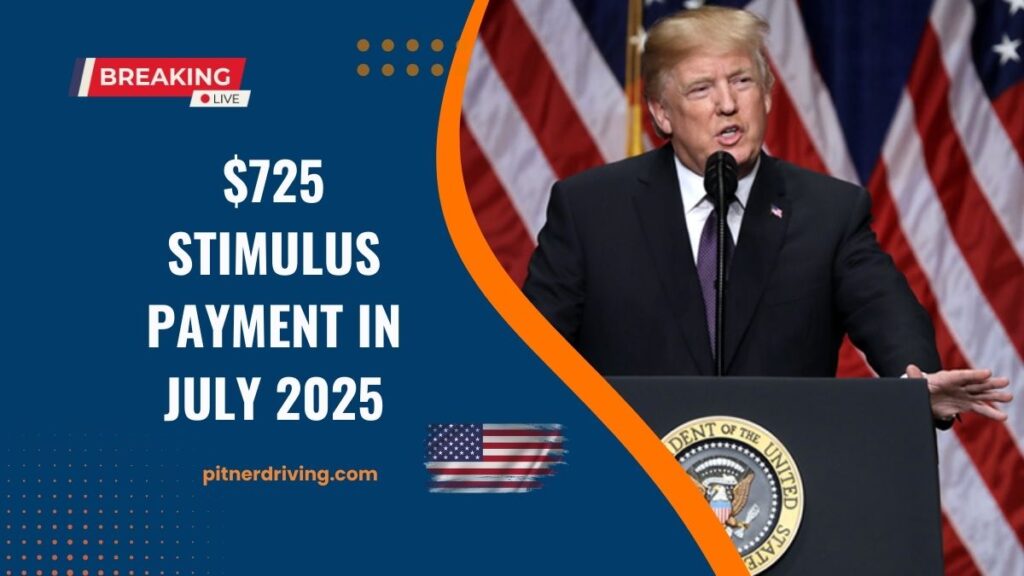As inflation continues to rise and everyday costs weigh heavily on American households, a new $725 stimulus payment is bringing much-needed relief.
Beginning July 15, 2025, eligible individuals in participating states will start receiving this one-time payment aimed at easing financial burdens from rent, groceries, and essential expenses.
Let’s explore everything you need to know—from eligibility and payment methods to state participation and tax status.
What is the $725 Stimulus Payment?
The $725 stimulus payment is a federally-supported, state-distributed relief measure under the Temporary Relief Initiative.
Unlike previous nationwide stimulus programs, this one targets states experiencing higher inflation or economic stress, using a combination of federal emergency reserves and state budget surpluses.
This payment isn’t automatic for everyone. It’s targeted at low- and moderate-income earners with specific criteria that vary by state.
Who is Eligible for the $725 Stimulus Payment?
To qualify, individuals must meet income thresholds and other eligibility criteria. Some general guidelines include:
- Individual income: Less than $75,000
- Joint filers: Less than $150,000
- Filed 2024 taxes
- Enrollment in qualifying programs like SNAP, SSI/SSDI, Medicaid
- Must reside in a participating state
Payment Schedule and Methods
The first round of deposits will begin July 15, 2025, and payments will be issued in phases to minimize system overload.
| Payment Method | Date Range | Details |
|---|---|---|
| Direct Deposit | July 15–19, 2025 | For those with bank info on file |
| Prepaid Debit Cards | July 18–23, 2025 | For recipients of EBT or state-issued benefit cards |
| Paper Checks | Starting July 22, 2025 | For those without banking access |
Payment notices will also be sent via email or physical mail based on your communication preferences with state agencies.
States Participating in the $725 Stimulus Program
Currently, 15 states are confirmed to distribute the stimulus payment:
- California
- Texas
- New York
- Florida
- Illinois
- Georgia
- Pennsylvania
- Arizona
- Washington
- Michigan
- New Jersey
- North Carolina
- Colorado
- Nevada
- Oregon
Visit your state’s Department of Revenue or Human Services website for details on local eligibility and timelines.
Can Social Security Recipients Get This Payment?
Yes, Social Security recipients, including SSI and SSDI beneficiaries, are eligible—if their income is below the required threshold. Many states have streamlined their systems to automatically send payments to eligible seniors, meaning no additional application is needed.
Is the $725 Stimulus Payment Taxable?
The IRS has clarified that this payment is non-taxable. It won’t count as income, and it won’t affect your eligibility for other benefits like SNAP, Medicaid, or housing assistance.
Why This Stimulus Payment Matters
Though the economy shows signs of recovery in some sectors, millions are still struggling. The $725 payment can help with:
- Rent or mortgage payments
- Groceries and utilities
- Medical bills and prescriptions
- Childcare or school supplies
It also reflects the government’s acknowledgment that post-pandemic inflation still impacts working-class and fixed-income Americans.
If you haven’t already, make sure to file your 2024 tax return, check whether your state is participating, and ensure your contact and banking details are updated.
Starting July 15, 2025, this $725 stimulus payment could offer just the support your household needs.
Stay alert to official communications and don’t fall for scams—no state or agency will ask you to pay to receive this benefit.
FAQs
When does the $725 stimulus payment start?
Payments begin July 15, 2025, and continue through late July depending on the payment method and state.
Do I need to apply to get the stimulus?
In most cases, no application is needed if you meet the eligibility and your records are current with tax or benefit agencies.
Will this affect my Social Security or SNAP benefits?
No, the payment is non-taxable and will not affect your eligibility for other federal or state programs.
